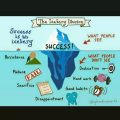Why Some Startups Succeed While Others Fail: A Deep Dive
The startup world is a fascinating realm where dreams are made, and fortunes are won or lost. Every year, thousands of aspiring entrepreneurs embark on a journey to turn their innovative ideas into successful businesses. However, the reality is that only a small fraction of these startups achieve success, while the majority succumb to failure.
But what sets apart the triumphant few from the rest? Is it mere luck, or are there specific factors at play? In this article, we’ll delve deep into the world of startups and explore the underlying reasons why some succeed while others fail. By examining the intricacies of startup success and failure, we aim to provide entrepreneurs with actionable insights to boost their chances of triumph.
I. The Right Idea
Having a great idea is the foundation upon which every successful startup is built. However, it’s not just about having any idea – it’s about having the right one. So, what makes an idea “right”? Several key elements come into play here:
- Solving a genuine problem: Startups that address real-world problems or needs have a higher likelihood of success. This is because they’re creating solutions that people are willing to pay for.
- Uniqueness and differentiation: In a crowded market, your idea should stand out from the competition. This could be through innovation, improved efficiency, or simply offering something new.
- Market demand and potential: Ensure there’s a viable market for your product or service. Assessing market size, growth prospects, and customer willingness to adopt is crucial.
A great example of a startup with the right idea is Airbnb. Founded in 2008 by Brian Chesky and Joe Gebbia, it addressed the need for affordable, unique accommodation options during peak travel seasons. By solving this real-world problem and differentiating itself through an innovative approach, Airbnb managed to capture a significant share of the market.
II. A Strong Team
No startup succeeds without a solid team behind it. The strength of your founding team is pivotal because it directly influences your ability to execute your vision effectively. Here are some characteristics of successful startup teams:
- Diverse skillset: Ensure your core team has a balanced mix of skills, covering key areas such as product development, marketing, finance, and operations.
- Shared vision and passion: Team members should share the same vision and be passionate about turning it into reality. This collective drive is essential for overcoming the inevitable challenges startups face.
- Adaptability and resilience: Startup journeys are inherently unpredictable. Teams that can adapt quickly to changes and remain resilient in the face of adversity have a higher chance of success.
Dropbox is an exemplary case of a startup built on the strength of its team. Founded by Drew Houston and Arash Ferdowsi, Dropbox succeeded because its founders shared a clear vision for simplifying file-sharing and had the technical expertise to execute it.
III. Effective Execution
Having the right idea and team in place are just the initial steps. The actual success of your startup hinges on how well you execute your plan. Key aspects of effective execution include:
- A well-defined business model: Your business model should clearly outline revenue streams, cost structures, and key partnerships.
- Agility in product development: Being agile allows you to iterate quickly based on customer feedback, ensuring your product meets market needs more accurately.
- Strategic marketing and sales strategies: Effective marketing and sales approaches are crucial for gaining traction and converting interest into revenue.
Instagram’s acquisition by Facebook is a prime example of effective execution. Initially launched as Burbn, an app focused on sharing location-based photos, videos, and making plans with friends, it later pivoted to focus solely on photo-sharing. This strategic pivot, coupled with its ability to execute effectively, made Instagram a highly successful startup.
IV. Access to Resources
Access to resources is often the unsung hero of startup success stories. These resources can include funding, mentorship, networking opportunities, and even physical spaces like coworking facilities or accelerators/incubators. Here’s how these resources can make a difference:
- Funding: Securing adequate funding is essential for startups to grow and scale their operations.
- Mentorship and guidance: Experienced mentors can provide invaluable advice and connections that help navigate the startup ecosystem more effectively.
- Networking opportunities: Being part of startup communities or attending industry events can lead to partnerships, collaborations, and learning from peers.
The story of Slack is a testament to the power of resources. Founded by Stewart Butterfield, it initially struggled as a gaming company called Glitch. However, after pivoting into team collaboration software and securing funding from investors, Slack was able to execute its vision more effectively, leading to massive success.
V. Adaptability and Continuous Learning
Startups operate in an environment of constant change. Being adaptable and open to learning is crucial for navigating these challenges:
- Market changes: Markets evolve rapidly. Startups that can adapt their strategies based on market feedback have a higher survival rate.
- Technological advancements: Keeping pace with technological advancements is essential for maintaining competitiveness.
Companies like Uber and Airbnb exemplify this trait. They’ve continuously adapted to regulatory changes, incorporated new technologies, and expanded into new markets, demonstrating the importance of being agile in response to external factors.
VI. Resilience in the Face of Failure
Failure is an inherent part of the startup journey. How you respond to failure can be a defining factor in your success:
- Learning from failures: Viewing failures as opportunities for growth and learning is crucial.
- Maintaining team morale: During tough times, it’s essential to keep your team motivated and focused on the end goal.
The story of Walt Disney is a classic example. Despite facing numerous setbacks, including bankruptcy and failure with his first company Laugh-O-Gram Studio, Disney continued to believe in himself and eventually went on to achieve monumental success.
Conclusion
In conclusion, the success or failure of a startup is influenced by a multitude of factors. From having the right idea that solves real-world problems, to assembling a strong team with diverse skills and shared vision, effective execution, access to resources, adaptability, and resilience in the face of failure all play critical roles.
While there’s no formula for guaranteed success, understanding and focusing on these elements can significantly improve your startup’s chances of thriving. As an entrepreneur, it’s essential to remain agile, open to learning, and willing to pivot when necessary. By embracing this mindset and staying committed to your vision, you’ll be better equipped to navigate the challenges and opportunities that lie ahead in the dynamic world of startups.
Final Thoughts
The journey of a startup is akin to navigating uncharted waters. While there are numerous factors beyond your control, focusing on those within your influence can make all the difference between success and failure. As you embark on this exciting yet challenging path, remember to stay true to your vision, learn from setbacks, and adapt to the ever-changing landscape of the startup world.










